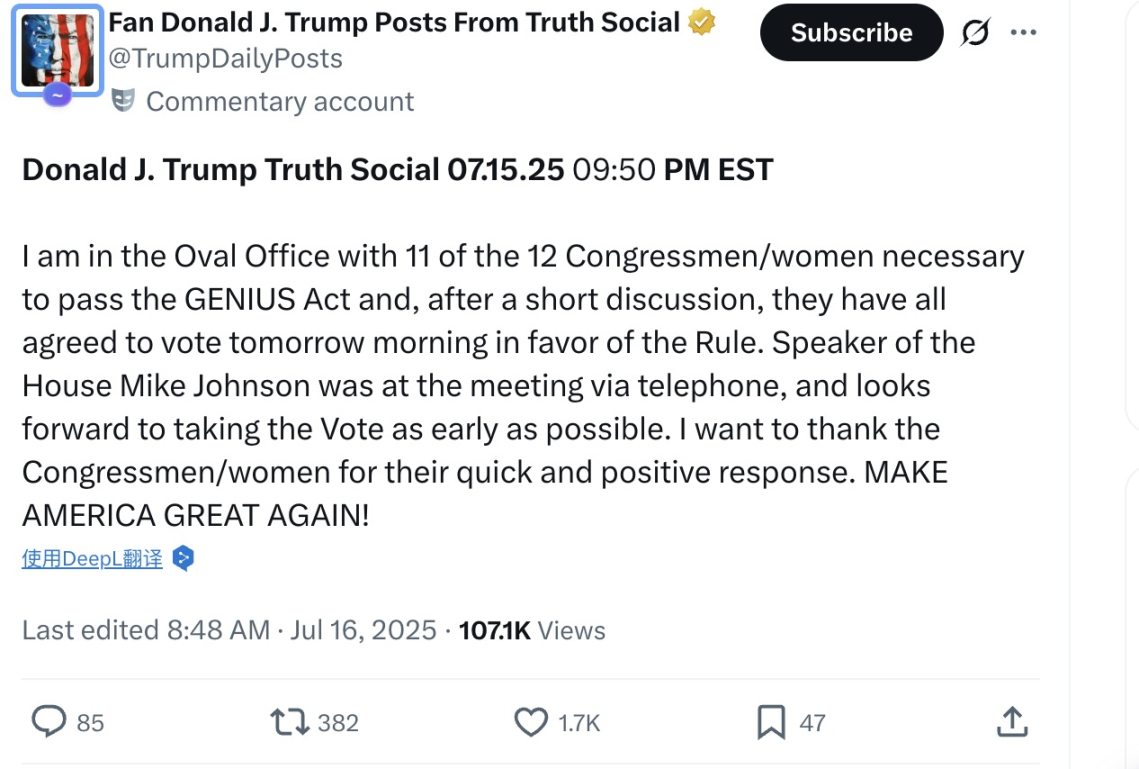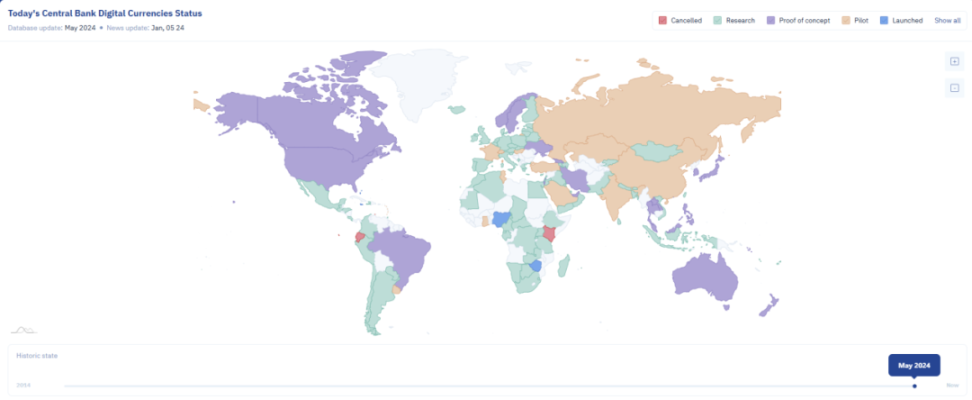Trump Is Getting Nervous! Why Is the U.S. So Hostile Toward Central Bank Digital Currencies?
On July 16, Beijing time, according to a report by Politico, the procedural vote on cryptocurrency-related bills in the U.S. House of Representatives failed to pass. According to Fox News, the House plans to attempt to vote again on the rules of procedure for cryptocurrency-related bills around 5:00 PM ET (5:00 AM Beijing time).
According to reports, President Trump was very “angry” after being slapped in the face. After the vote failed in the House of Representatives, Trump immediately posted that the GENIUS Act would pass tomorrow, and he met with 11 opposing congressmen today in the Oval Office to discuss passing legislative rules such as the “GENIUS Act,” and they reached a consensus to support the rules the following morning.

However, the House Democratic whip later stated that there is no additional cryptocurrency bill voting plan today. The vote concluded with 196 votes in favor vs 222 votes against, preventing three cryptocurrency bills, including stablecoin regulations, and the defense spending bill from entering the formal review stage. The cryptocurrency bills included are mainly:
GENIUS Act (Stablecoin Regulation)
CLARITY Act (Central Bank Digital Money Market Structure Regulation)
Anti-CBDC Surveillance State Act
U.S. House Speaker Johnson could only awkwardly state that he hopes to make another procedural vote on the cryptocurrency bill in the House on Wednesday.
The aggressive Trump administration
After the GENIUS Act passed the Senate on June 18, Trump immediately expressed his hope to see the bill on the President’s desk before Congress goes into recess in August. Market news also unanimously believes that the House’s vote on the GENIUS Act is merely a “formality,” and its formal passage is practically a done deal.
Before the House of Representatives conducted a “procedural vote” on GENIUS, Trump had already posted on social media to “pop the champagne,” stating: “Happy Crypto Week. The House is about to vote on a significant bill, the GENIUS Act, aimed at making the United States the undisputed number one leader in the digital asset space. Digital assets represent the future, and America is far ahead. Let’s complete the first vote this afternoon (all Republicans should vote in favor). This is our moment. It’s all about making America great again, stronger and more exceptional than ever. We are leading the world and will work together with the Senate and House to push for more relevant legislation to be passed.”
Why is it so badly “slapped in the face”? CBDC is actually the original sin.
However, the reason why the House of Representatives did not follow the script to complete a series of votes on cryptocurrency bills may not be that the GENUIS stablecoin bill is the center of the conflict. Before the meeting, the sudden statement from David Sacks, the White House AI and cryptocurrency director, known as the “crypto czar,” is indeed intriguing. He clearly stated that the Trump administration intends to ban the issuance of Central Bank Digital Currency (CBDC).
It is evident that the Anti-CBDC Surveillance State Act may indeed be the real battleground for both parties.
The Republican Party and the Democratic Party have long been at odds over the issue of CBDC, and the Biden administration is committed to advancing CBDC. In March 2022, Biden signed Executive Order 14067: “Ensuring Responsible Development of Digital Assets,” placing the research and development of designing and deploying CBDC as a top priority. In March 2023, Nellie Liang, the Deputy Secretary of the Treasury for Domestic Finance, announced in a speech at the Atlantic Council that the Treasury would convene an interagency working group to explore the development of CBDC, allowing the United States to “swiftly move forward in determining that CBDC is in the national interest.”
To enhance the status of CBDC, the Biden administration does not hesitate to suppress cryptocurrencies. In March of the same year, the White House Council of Economic Advisers released its annual report, which included a whole chapter dedicated to discussing digital assets. The report positions CBDC and the FedNow payment system launched by the Federal Reserve as more promising avenues for enhancing currency and finance, and expresses the viewpoint of suppressing cryptocurrencies, arguing that cryptocurrencies are almost worthless aside from the risks of speculation. This report subsequently became the ideological cornerstone of the Biden administration’s ongoing high-pressure stance on the crypto industry.

The camp that vehemently opposes CBDC is filled with mainstream Republicans, Silicon Valley libertarians, anti-establishment leftists, and cryptocurrency practitioners, all of whom uniformly oppose CBDC citing concerns over privacy and government control. By the end of the Biden administration, the Democratic Party’s vision for CBDC has essentially collapsed. The “Anti-CBDC Surveillance State Act” was passed in the House of Representatives in May 2024, while the Senate had not yet voted on it. The bill explicitly prohibits the Federal Reserve from issuing retail Central Bank Digital Currency (CBDC) directly or indirectly to the public through intermediaries, and it cannot be used for open market operations or any monetary policy tools, and any form of CBDC testing is also prohibited.

As expected, on January 23, 2025, U.S. time, Trump, who took office as the new president, immediately signed an executive order prohibiting any institutions from issuing or using Central Bank Digital Currency (CBDC) within or outside the United States, while relaxing regulations on privately issued digital money, and established a digital asset market task force led by the U.S. president, which later became the White House Artificial Intelligence and Cryptocurrency Task Force chaired by David Sacks.
Therefore, the anti-CBDC bill is essentially the source of legitimacy for the crypto bills such as GENUIS promoted by the Trump administration. The failure of these three substantial cryptocurrency bills to pass is fundamentally due to the struggle between the mainstream CBDC establishment of the Democrats and the mainstream cryptocurrency faction of the Republicans.
However, from a social perspective, there is a lack of actual public support for CBDC in the United States. Previous polls showed that only about 16% of Americans expressed support for CBDC, while 78% indicated that they are “unlikely to use” it, with more than half stating that they are “extremely unlikely to use” it.
In this regard, CICC once published a research report pointing out that the “Anti-CBDC Surveillance State Act”, the “CLARITY Act”, and the “GENIUS Act” together form a logical closed loop for the regulation of digital currency in the United States. It reflects America’s strategic choice: to abandon a government-led CBDC and instead support the issuance of dollar stablecoins by the private sector, implementing policy guidance and regulation on them. Amid the global wave of central banks exploring CBDCs, this move also highlights the differentiated path of traditional Republicans based on the concept of “small government, large market”. In the long run, dollar stablecoins and CBDCs issued by various countries will form a competitive relationship; to some extent, this divergence in approach represents another competition between the market and the government on the innovation track.
Statement:
- This article is reprinted from [Bright, Foresight News] The copyright belongs to the original author [Foresight News] If you have any objections to the reprint, please contact Gate Learn TeamThe team will process it as quickly as possible according to the relevant procedures.
- Disclaimer: The views and opinions expressed in this article are solely those of the author and do not constitute any investment advice.
- The other language versions of the article are translated by the Gate Learn team, unless otherwise mentioned.GateUnder such circumstances, it is prohibited to copy, disseminate, or plagiarize translated articles.





